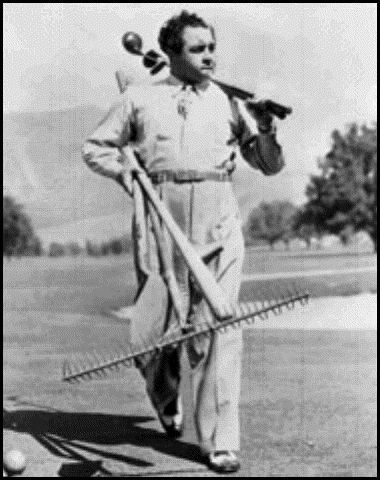A Press Box Legend's
Classic Sportswriting
John Schulian, Editor
(Bison Books)

Indeed, it was Red Smith who quoted Lardner's epic lead from 1944, "Stanley Ketchel was twenty-four years old when he was fatally shot in the back by the common-law husband of the lady who was cooking his breakfast." Smith claimed that it was "the greatest novel ever written in one sentence."
Editor Schulian has culled almost fifty of Lardner's columns from True, The New Yorker, Sport and Newsweek. There are stories on boxing, golf, baseball, wrestling and the roller derby. There are also such great items as the famous quote by Joe Jacobs --- "I should of stood in bed" --- which I once tried to use in an article at salon.com but the line was killed by an editor who didn't get it. (In interests of honesty, I have to say that I did try to bring the quote back to its original vernacular. I wrote, "I shudda stood in bed.")
We also have here, from the same source, fortunately rendered appropriately in the vernacular, "We wuz robbed." This last was "uttered after Max Schmeling and Mr. Jacobs had licked the stuffing out of Jack Sharkey, only to hear the verdict go against them."
Though as I have admitted I know little about sports writing, I would guess that it has to be brief, pithy, not high-falutin' ... in a word, aimed at its audience. Like Zern and Scully, Lardner is no pantywaist, and he does his homework. The phrase "The Real McCoy?"
- The hotel manager and the detective stood looking down at the man on the bed, who had killed himself during the night. "Norman Selby, it says on the note, and Selby was how he checked in," the manager said. "Wasn't that his right name?"
"It was his right name," the detective said: "But he was also McCoy. The real McCoy."
Red Smith could have said that this was one of the world's greatest detective stories in two short paragraphs. Indeed, it is in the scandalous thieving ways of people like McCoy and "Mysterious Montague" that Lardner excels. Monty, we learn, for a bet, once hit a golf ball "three quarters of a mile in five shots."
- For a bet of $1,000, using a rake, a shovel, and a baseball bat for clubs, he had won an eighteen-hole march from Bing Crosby.
All good sports writing --- like all writing --- demands not only pith and wit, but it needs a tad of psychology to ring true. Lardner says that McCoy, the real McCoy, "did not need tricks to be great."
- He cheated because he loved to cheat, just as, in the early days he married women because he loved them.
This last turns up because McCoy married eight times in his life, three times to the same woman.
Schulian has done a fine job of picking and choosing here. He shows himself to be a bit of an artisan, too. At the end of his nicely written --- at points moving --- introduction, he confesses that he has now to shut up: "I'm just the guy who's opening the door."
- It's John Lardner you're here for, and you've kept him waiting for this showcase long enough, nearly fifty years to be exact.
"He was too great to be put in a holding pattern, too great to be forgotten."